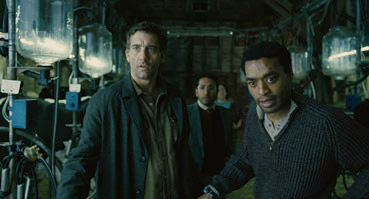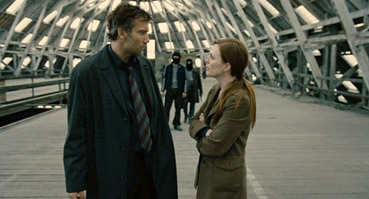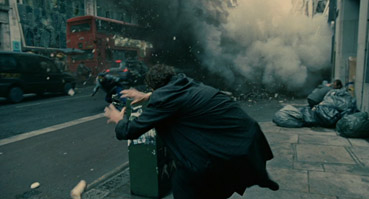|
Is
the human race really worth saving? You get some funny responses
to that question. Twice in the past couple of years, acquaintances
of mine have suggested that the planet might just be better
off without us. What struck me as particularly odd about this statement, at least coming from them, is that they both have kids. If they really believed that
sentiment, then they were effectively offering their children
up for sacrifice due to the misdeeds of others. Not
people they know personally, mind you, but those ones on
the news, or in the papers, or on Police, Camera, Action,
or whoever it is whose behaviour the media wants to highlight
this week and the government wants us to be scared
of.
Personally I've always found the end of the world a rather
attractive prospect, but I realise that I'm talking largely
in storytelling terms, as a situation for apocalyptic novels
and films and even TV series (Ah, Survivors...).
I will confess, however, that once when I was asked how
I'd prefer to die if I was given the choice I replied, a
little too quickly, "at the same time as everyone else."
It wasn't dying itself I objected to, but the idea that
others, people I didn't like or respect, would have the
cheek to carry on living after I'd snuffed it. At least
if we all went together it would feel a little fairer.

As
someone who finds children of all ages largely intolerable,
the situation proposed by P.D. James' 1992 novel Children
of Men and the 2005 film of the same title should
in theory seem rather appealing. With women across the world rendered
infertile, the human race, steadily ageing and unable to
replenish the stock, is doomed. A world without children
and thus a world without a future, at least for humankind.
Would that really be so bad? Well if the dystopian vision
of a 2027 Britain presented to us in Alfonso Cuarón's
masterful futuristic thriller is anything to go by, it doesn't look too rosy.
In
Children of Men, the time limit on humanity
imposed by this inability to procreate has robbed the populace
of an sense of hope and, it is suggested, inspired a society-wide
moral and ethical breakdown. I'm not sure I buy that connection
in a world in which the earth and its resources are already
being shredded in the name of profit with little real thought
for how the future generation will pick up the pieces, but
I'm prepared to go with it for the sake of the story. The
future as presented here seems more a downward development
of the Britain of today, or at least the version of it that
is presented by the media. Tabloid scare stories about asylum
seekers have mutated into draconian government policy, terrorism
is rife, law and order is crumbling, and ubiquitous Orwellian
viewscreens feed propaganda to every caged-up train carriage
and tattered street corner.
Stumbling
around in the mire is former activist turned part-time bureaucrat
and full-time melancholic, Theo Faron, who only minutes into
the film is nearly blown to pieces by a terrorist bomb and a short while later is kidnapped
by a resistance group led by his ex-wife Julian. She's looking
for transit papers for Kee, an immigrant woman under their
protection, and Theo needs the cash and has an old friend
in the government who appears just world-weary enough to
obtain the documents. But there's a catch – the documents
are for two and Theo has to accompany her. A series of plot
developments lead to a revelation that will not be a revelation
at all to anyone who's seen the trailer or read anything
at all about the film. If you haven't you might want to
skip to the end of this review now.
Theo discovers that Kee is pregnant and
the task he inherits is to help transport her to an off-shore
location where she can safely have the first baby the world has
seen in eighteen years. Although
not a parable per se, the religious and specifically Christian
overtones are hard to ignore, a child whose arrival represents
possible salvation for mankind, its mother giving birth
in a meagre shelter and the mere sight of the infant stunning
soldiers into awed, chest-crossing silence. Even the film's
title has religious connotations, taken from a psalm that
is quoted in the novel but not the film ("Come again,
ye children of men. For a thousand years in thy sight are
but as yesterday: Seeing that is past as a watch in the
night") and a gender-free plural of a famous Christian
term for Jesus. But this is never hammered home and sits
very comfortably with the more prominent sociopolitical
and thriller elements. And these are most impressively realised.

As
someone who has railed against CGI in the past, I feel I
should qualify the apparent turn-around I am about to make.
The possibilities offered by this tool are, at its present
stage of development, seemingly infinite, but too often filmmakers
choose to run with that freedom like greedy kids
in a candy factory, creating sequences
that exist largely to draw attention to themselves, toppling
the film off the ledge of plausibility in the process. For
my money CGI really fulfils its potential as a cinematic
magic wand when you genuinely cannot
tell whether you are looking at a constructed set, a model,
a computer generated image or a blend of all three. Such
is the case here. Right from the opening scene, the damaged
Britain of 2027 is visualised with startling realism, with entire
streets transformed and attention paid to the smallest of
details (blink and you'll miss the video advertising that
adorns the side of London buses), creating an almost documentary-like
sense of a once great city in moral and physical disintegration.
Clearly
taking the advice offered by his friend and fellow Mexican director
Guillermo del Toro to always serve the story, Cuarón
makes the characters and narrative his priority.
The twists are perfectly timed and the predicted arcs not
always followed – we expect sacrifices, but at least two
come out of nowhere, and by the second half the tone is dark enough to ensure that there are no guarantees of a positive outcome
for Theo's quest. The
performances are largely excellent, the real revelation
being Clive Owen as Theo. An actor who on some previous
occasions looked in danger of joining Rupert Everett and
Jonathan Rhys-Meyers as specialists in gaunt, moody cheerlessness,
here he compelling holds centre stage, a seemingly unlikely
hero who rediscovers a cause and the will to risk all for
it. The supporting cast, which includes site favourites
Julianne Moore, Peter Mullan and Danny Huston, are all fine – the only one I'm not sure about is Michael Caine's dope-growing, holed-up-in-the-woods ex-protestor Jasper.
He's clearly having fun with the role and the performance
is enjoyable enough in its own right, but he always felt to me like Michael Caine dressed up as a hippy, the sort
of left-wing idealist the actor once fled the
country to avoid. I can't help thinking that there are many
lesser known character actors who would have better suited
the role, but who would, of course, have been less of a box-office draw.
Cuarón
demonstrated both his cinematic dexterity and skill with
performers back 2001 with the splendid Y tu mamá
también, and after a trip to Hollywood for
Harry Potter and the Prisoner of Azkaban (a movie I have so far failed to see – odd that), he makes
the transition from Mexico to Southern England as if he's
been boning up for the stiffest nationality test imaginable.
Part of the film's uncanny sense of the familiar
comes from keeping the future rooted at least partly in
the here and now – even at its most extreme the imagery is
still instantly recognisable, as when Theo ducks and dives
his way through a battle-torn estate, recalling news footage
of civilians caught up in street battles in, well you name
your recent war, and shot (in a breathtakingly executed
nine-minute take*) as if captured by a TV news cameraman
also in fear of his safety.

The
action is always impressively staged, and more than once
I was left unsure whether I was watching stunt work or very
smart CG trickery. There are memorable and inventive
touches texturing almost every scene, from the Diana Spencer-like
outpouring of grief at the death of the world's youngest
person to the contemporary protest headlines on the
clippings in Jasper's house, or the getaway car that has
to be freewheeled and bump-started to secure a precarious
escape. From its opening scene, Children of Men tells an intelligent and well constructed
story with fully rounded characters in consistently gripping fashion. Its dark outlook
is refreshingly welcome for a film with a Hollywood-sized
budget, a big studio distribution deal and three Oscar nominations
(inevitably two of these are technical gongs), although
I couldn't help wondering if the film would have attractive similar financial backing if the novel had been set in an American
city a few years from now...
The
cinematography (courtesy of Cuarón regular Emmanuel
Lubezki) is very much part of the film's distinctive aesthetic,
key components of which are a steely palette that is deliberately
lacking in bright colours, and tweaks made to the contrast and
brightness levels that appear that give even sunlit exteriors
have a hint of gloom. All of this is reproduced on DVD very
nicely, with colour, contrast and sharpness looking dead
right to my eyes. The framing is 1.85:1 and the picture
is anamorphically enhanced.
The
5.1 track has impressive clarity and decent frontal separation.
The surrounds come to life during key scenes, especially
in the 9-minute combat shot, but it's somewhat less aggressive
than you might expect. It's worth cranking the volume up
to get the best out of this.
Men
Under Attack (7:36)
I can't help thinking it a bit cheeky to have a section
on the main menu titled 'Bonus' that only has one, 7-minute
inclusion. It's a damned interesting one, though, covering
the shooting of two of the single-take action sequences,
including a complex in-car shot that runs for 12 uninterrupted
minutes.
The
lack of extra features is most definitely what lets this
disc down, as this film cries out for a commentary track
and detailed coverage the production design, stunt work,
special effects, and even the novel itself. One for 2-disc
re-issue later, then?
Camus
reviewed this film on its cinema release last year (you
can read the review here),
and different though our viewing habits tend to be, this
is one we seem to have found ourselves in total agreement
on. I've been surprised by the more negative reactions I've
encountered in some quarters, although its failure to ignite
at the US box-office should not be surprising when a sizeable
proportion of the audience still seem to only respond to
happy happy happy. Children of Men is a
rare and fine example of film with indie sensibilities made
on a mainstream budget, and one that really deserves to
find an appreciative audience. The DVD sounds good, looks
very good, but is left waiting for a set of extra features
to do it justice.
|